William Henry Margetson
William Henry Margetson RI (London December 1861 – 2 January 1940) was a British painter and illustrator, mainly known for his aesthetic portraits of women.
Life and work
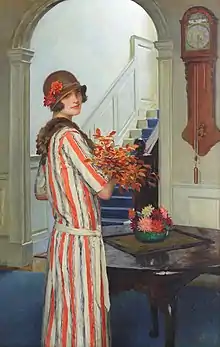
Margetson was born at Camberwell, London. He studied at Dulwich College, and later at the Royal College of Art and the Royal Academy Schools. In 1885 he first exhibited at the Royal Academy, and later also at the Royal Society of British Artists, the Royal Institute of Oil Painters and the Grosvenor Gallery. In late 1885 he won the Armitage Medal for his studies at the RA, which is now in the British Museum.[1]
Margetson painted in oils and watercolours. He made his name with portraits of beautiful women, often with modern hairstyles and hats. He also created religious and allegorical artworks. To begin with he worked in an academic, Victorian style. Later he would use a looser brushstyle inspired by the post-impressionists and the pre-raphaelites, and in particular Lawrence Alma-Tadema. His most successful work was the classically decorative The Sea Hath its Pearls which he exhibited in 1897 at the Royal Academy, now in the possession of the Art Gallery of New South Wales, in Australia.
A portrait of Alfred Tennyson by Margetson is in the National Portrait Gallery in London.
Margetson also worked as an illustrator of books. He was married to the artist Helen Hatton, who he met when they worked on an illustration project together. He lived and worked first in London and later in Blewbury and Wallingford. He died in Wallingford, Oxfordshire, in 1940, at the age of 78.
Gallery
 The Sea Hath its Pearls
The Sea Hath its Pearls The seashore
The seashore A Summer Evening
A Summer Evening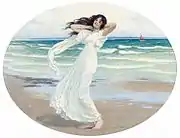 Poseidon's mistress on the shore
Poseidon's mistress on the shore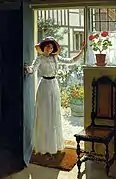 At The Cottage Door
At The Cottage Door A New Day
A New Day A Stitch in Time
A Stitch in Time Girl by a Lock
Girl by a Lock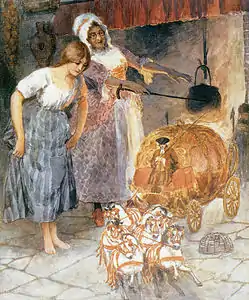 Cinderella and the Fairy Godmother
Cinderella and the Fairy Godmother Faith
Faith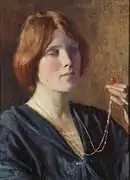 The Amulet
The Amulet Nora
Nora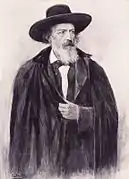 Alfred Lord Tennyson
Alfred Lord Tennyson Helen Hatton
Helen Hatton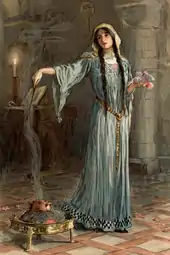 Morgan le Fay from Margetson's illustrations for The Legends of King Arthur and His Knights (1908)
Morgan le Fay from Margetson's illustrations for The Legends of King Arthur and His Knights (1908)
References
- "medal | British Museum". The British Museum.
External links
- Margetson on Artists and Art
- 2 artworks by or after William Henry Margetson at the Art UK site
- Short biography
- W. H. Margetson at Library of Congress, with 2 library catalogue records